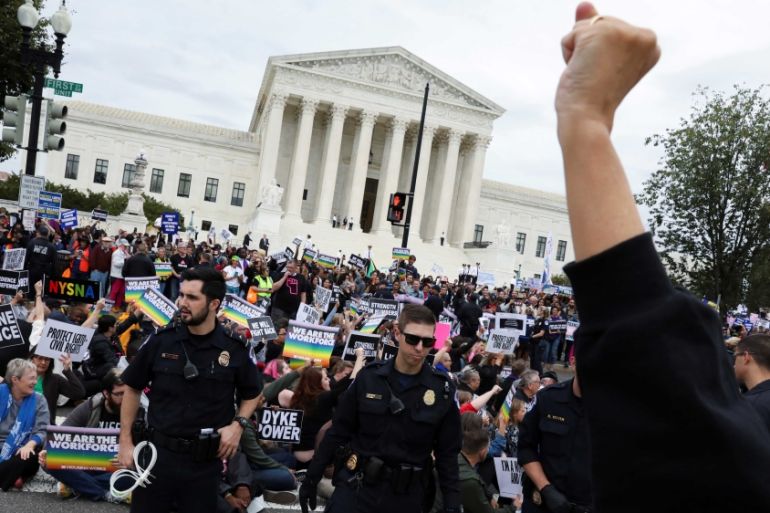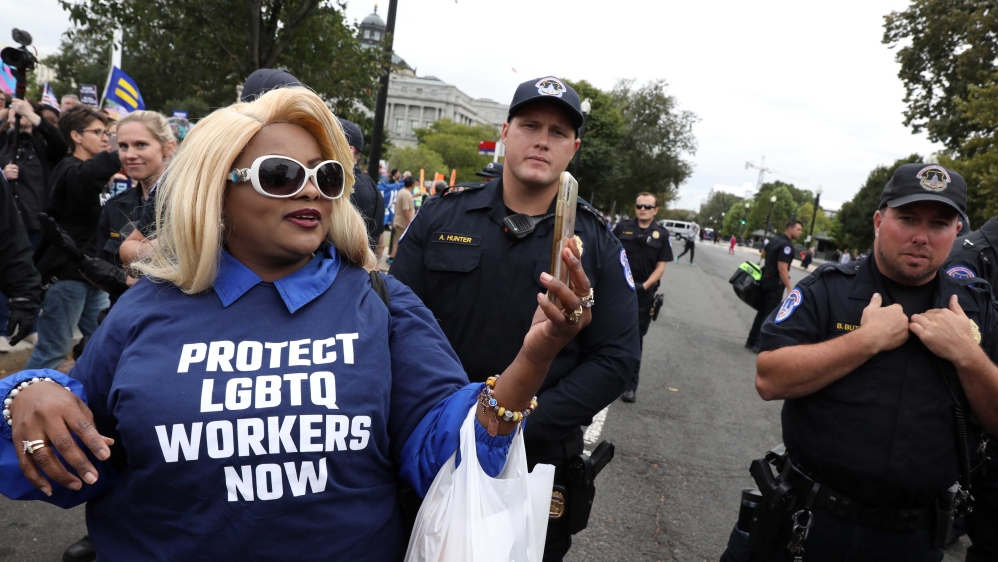US Supreme Court endorses gay, transgender worker protections
The outcome is expected to make a big difference for the estimated 8.1 million LGBT workers across the US.

The Supreme Court ruled on Monday that a landmark civil rights law protects LGBT people from discrimination in employment, a resounding victory for LGBT rights from a conservative court.
The court decided by a 6-3 vote that a key provision of the Civil Rights Act of 1964 known as Title VII that bars job discrimination because of sex, among other reasons, encompasses bias against LGBT workers.
Keep reading
list of 3 itemsRayshard Brooks’ fatal shooting: What we know so far
Family want answers after Black man found hanging in California
“An employer who fires an individual for being homosexual or transgender fires that person for traits or actions it would not have questioned in members of a different sex. Sex plays a necessary and undisguisable role in the decision, exactly what Title VII forbids,” Justice Neil Gorsuch wrote for the court.
The dissent
Justices Samuel Alito, Brett Kavanaugh and Clarence Thomas dissented.
“The Court tries to convince readers that it is merely enforcing the terms of the statute, but that is preposterous. Even as understood today, the concept of discrimination because of ‘sex’ is different from discrimination because of ‘sexual orientation’ or ‘gender identity’,” Alito wrote in a dissent that was joined by Thomas.
The outcome is expected to have a significant effect on the estimated 8.1 million LGBT workers across the country because most states do not protect them from workplace discrimination. An estimated 11.3 million LGBT people live in the US, according to the Williams Institute at the UCLA law school.
The cases were the court’s first on LGBT rights since Justice Anthony Kennedy’s retirement and replacement by Kavanaugh. Kennedy was a voice for gay rights and the author of the landmark ruling in 2015 that made same-sex marriage legal throughout the United States. Kavanaugh is generally regarded as more conservative.
The Trump administration had changed course from the Obama administration, which supported LGBT workers in their discrimination claims under Title VII.
During the Obama years, the federal Equal Employment Opportunity Commission had changed its long-standing interpretation of civil rights law to include discrimination against LGBT people. The law prohibits discrimination because of sex but has no specific protection for sexual orientation or gender identity.
In recent years, some lower courts have held that discrimination against LGBT people is a subset of sex discrimination, and thus prohibited by the federal law.
Efforts by Congress to change the law have so far failed.
Massive win for us legally- MASSIVE.
This should also invalidate the anti lgbt rule trump just enacted last week allowing denying health care to LGBT, I would think. But either way- this is a huge win for us LGBT humans:)🏳️🌈🏳️🌈🏳️🌈💪🏼💪🏽💪🏾 https://t.co/OqSJAikywp— Martina Navratilova (@Martina) June 15, 2020
The Supreme Court cases involved two gay men and a transgender woman who sued for employment discrimination after they lost their jobs.
Fired from jobs
The federal appeals court in New York ruled in favour of a gay skydiving instructor who claimed he was fired because of his sexual orientation. The full 2nd US Circuit Court of Appeals ruled 10-3 that it was abandoning its earlier holding that Title VII did not cover sexual orientation because “legal doctrine evolves”. The court held that “sexual orientation discrimination is motivated, at least in part, by sex and is thus a subset of sex discrimination.”
That ruling was a victory for the relatives of Donald Zarda, who was fired in 2010 from a skydiving job in Central Islip, New York, that required him to strap himself tightly to clients so they could jump in tandem from an aeroplane. He tried to put a woman with whom he was jumping at ease by explaining he was gay. The school fired Zarda after the woman’s boyfriend called to complain.
Zarda died in a wingsuit accident in Switzerland in 2014.

In a case from Georgia, the federal appeals court in Atlanta ruled against Gerald Bostock, a gay employee of Clayton County, in the Atlanta suburbs. Bostock claimed he was fired in 2013 because he is gay. The county argues that Bostock was let go because of the results of an audit of funds he managed.
The 11th US Circuit Court of Appeals dismissed Bostock’s claim in a three-page opinion that noted the court was bound by a 1979 decision that held “discharge for homosexuality is not prohibited by Title VII”.
Aimee Stephens lost her job as a funeral director in the Detroit area after she revealed to her boss that she had struggled with her gender most of her life and had, at long last, “decided to become the person that my mind already is”. Stephens told funeral homeowner Thomas Rost that following a vacation, she would report to work wearing a conservative skirt suit or dress that Rost required for women who worked at his three funeral homes. Rost fired Stephens.
The 6th US Circuit Court of Appeals in Cincinnati, Ohio, ruled that the firing constituted sex discrimination under federal law.
Stephens died last month.
Democratic presidential hopeful Joe Biden hailed the decision as “a momentous step forward” towards equality in the US.
“Before today, in more than half of states, LGBTQ+ people could get married one day and be fired from their job the next day under state law, simply because of who they are or who they love,” he said in a statement issued on Monday.
“This landmark 6–3 ruling affirms that LGBTQ+ Americans are entitled to equal rights under the law,” according to the statement.